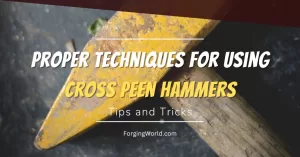Bronze is a fascinating material. It is an alloy of many metals, primarily copper. However, it can be challenging for someone who is not familiar with metals to tell the difference between bronze and other metals such as copper and brass. But what about its application in blacksmithing? So many people wonder whether it can be forged or not.
We also know that the Egyptians and Phoenicians used it for making their swords. Note that in their case, there was a lot of casting involved in the process. Ok, but how about now, in the 21st century?
You can forge bronze, but it is necessary to pay attention to the forging temperature. In most cases, if you go any hotter than red color, it will probably melt. Note that silicon bronze is usually the best choice for forging purposes. Due to the more even heat, a propane forge is generally recommended.
In the rest of the article, I will answer other relevant questions like:
- How to forge bronze?
- What is the forging temperature of bronze?
- Can you harden bronze?
- Can bronze be forged-welded?
So, make yourself comfortable and grab your coffee. Let’s dive in.
What is Bronze?
Bronze is an alloy that consists mainly of copper and tin. Other metals typically include manganese, aluminum, zinc, silicon, and nickel. This mix makes the bronze harder than copper alone, and it also improves mechanical properties such as ductility, strength, and machinability.
Since silicon bronze is primarily used in blacksmithing, I will put more focus on it. Like all other bronzes, silicon bronze is no different in regards to the fact it is a copper alloy. It is made using around 95% copper, while the rest is usually 2-6% silicon and a mix of other materials like aluminum, lead, iron, manganese, and more.
Today, some of the main applications of bronze include valve parts, marine parts, pump housing, fire sprinkle parts, the water supply industry, bushings, bearings, and much more.
How to Forge Bronze
Okay, once we know that forging bronze is indeed possible, let us see which way we can achieve that.
First and foremost, you have to decide what your goal is. What project do you plan to do? Whether it is a knife, sword, or spoon, it must be planned and designed. As I have already said, silicon bronze is the most common type for forging purposes. In order to improve the hardness and enhance resistance to corrosion, small amounts of silicon are added to some alloys.
Keep in mind that forging bronze can be a tricky process since it is usually very brittle. The very little I have worked with bronze, it cracked and fell apart almost like cast iron.
Once you know what you want to make and prepare your material, it is time for the nuts and bolts of this process, the forging. Place your bronze in the forge (propane forge recommended) and wait until it reaches somewhere between 500-900 degrees Celsius around dull red color. This is why I often recommend working in a dark workshop so you can see the colors of your material better.
If it reaches higher temperatures (orange color), let it air cool to a dull red and start shaping it with the hammer. When it comes to hammering, you have to be careful when working with bronze since it is very brittle. This is where proper hammering technique becomes vital. Unfortunately, bronze cannot be quenched or hardened effectively. Instead, it can be work-hardened.
I noticed some people are wondering whether it is possible to cold-forge bronze. While it is possible, I highly recommend either hot forging or casting. If you really want to cold-forge something similar, then feel free to try brass.
What tools do you need to forge bronze?
Finally, I want to talk about the tools required for forging bronze. Note that there are a lot of sources online telling you that you must have all kinds of tools to do even some simple projects. Don’t get caught up in that hype. I know some people spent thousands of dollars on the equipment before they learned how to hold the hammer properly.
For forging basic projects out of bronze, all you need is some kind of forge, an anvil, and a hammer. Some of the extra tools you might need would be wood forming mallet, a scribe, and a jeweler saw, depending on which type of project you want to create.
Keep in mind that when it comes to hammers, I would suggest using a lighter one, somewhere between 1-3 pounds. In most cases, you won’t need the heavier one since bronze is a soft material and very prone to cracking. Depending on the size of the material, the anvil’s ideal size will vary. If you plan to do jewelry, then a 10-20 pound anvil will be more than sufficient.
On the other hand, if you want to make a knife or sword, you might want to get yourself a heavier anvil, somewhere around 80-100 lbs at least.
Finally, I highly recommend using a propane forge to forge materials like bronze since it generally produces more even heat than a coal forge.
Also, if you are a beginner, using propane forge has even more advantages. For instance, you don’t have to worry about losing the fire while focusing on the anvil’s work. Propane forge is also much easier to use. The problem with coal/charcoal forges is that they tend to overheat some material areas, which may cause melting in this case.
Frequently Asked Questions About Forging Bronze
Can you harden bronze?
Let’s say you want to make a blade out of bronze which requires hardening. What do you do?
You can harden bronze. However, quenching is not the ideal option since it is a relatively soft material. Instead, the process of work hardening is generally used, which improves the tensile, yield strength, and hardness of the material.
Can bronze be forged-welded?
Forge welding is technically possible but extremely hard due to the narrow range of temperatures where bronze is separate and able to be welded or melted. For beginners, I highly recommend sticking with cold forging or casting and then moving on to forge welding.
Why are bronze items so expensive?
Bronze as a material is expensive because of the processes required to manufacture it. On the other hand, items made of bronze are generally expensive due to the material itself and the labor cost. Namely, it requires specialist facilities to cast it.
What are the safety precautions required to take when working with bronze?
When working with bronze, you should take the same safety precautions when working with steel or some other material. Wearing safety equipment and respecting safety precautions are required for all blacksmiths, not just beginners.

